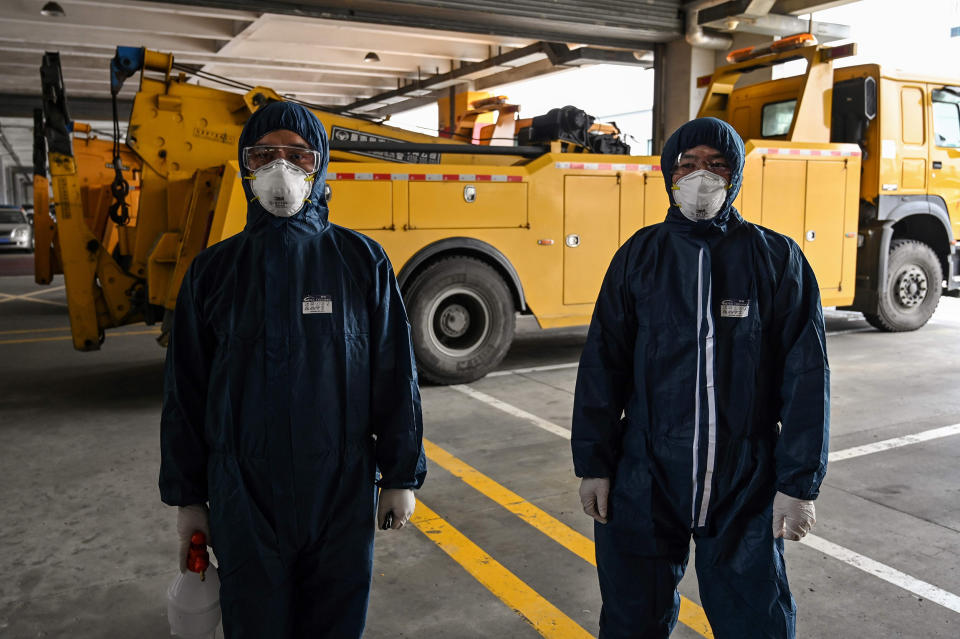Chinese official suggests U.S. Army to blame for outbreak
Chinese officials have sidestepped questions about whether Beijing blames Washington for the coronavirus outbreak after a foreign ministry spokesman suggested it could have been planted by the U.S. Army.
"When did patient zero begin in U.S.? How many people are infected? What are the names of the hospitals? It might be U.S. army who brought the epidemic to Wuhan,” Zhao Lijian tweeted in both Chinese and English on Thursday. “Be transparent! Make public your data! U.S. owe us an explanation!"
His post was accompanied by a video of Dr. Robert Redfield, director of the Centers for Disease Control and Prevention, saying that some Americans who had seemingly died from influenza later tested positive for the new coronavirus.
2/2 CDC was caught on the spot. When did patient zero begin in US? How many people are infected? What are the names of the hospitals? It might be US army who brought the epidemic to Wuhan. Be transparent! Make public your data! US owe us an explanation! pic.twitter.com/vYNZRFPWo3
— Lijian Zhao 赵立坚 (@zlj517) March 12, 2020
Zhao, who was based at the Chinese Embassy in Pakistan before moving to the foreign ministry in February, is a prolific social media user; a hashtag referring to his posts was trending on the Chinese social media platform Weibo on Friday with more than 89,000 mentions. He is known for being outspoken and for his sometimes outrageous comments.
His post came shortly after his boss and the ministry's top spokesperson Hua Chunying, retweeted the same video of Redfield, alongside a post which read: "It is absolutely WRONG and INAPPROPRIATE to call this the Chinese coronavirus."
@CDCDirector Dr. Robert Redfield: Some cases that were previously diagnosed as Flu in the US were actually #COVID19. It is absolutely WRONG and INAPPROPRIATE to call this the Chinese coronavirus. https://t.co/Mk4RB7XYq0
— Hua Chunying 华春莹 (@SpokespersonCHN) March 12, 2020
When their colleague Geng Shuang was asked if their comments reflected Beijing’s official views on the virus — which is believed to have been transferred to humans at a market in the central Chinese city of Wuhan where the pathogen first broke out — he did not directly comment.
“The international community, including the U.S., have different opinions about the origin of the virus," he told the Reuters press agency, adding that the origin of the virus was a scientific matter and as such, scientific views should be listened to.

Although Twitter is blocked in China, Chinese diplomats using the platform have appeared eager to float the idea that the virus did not necessarily start in their country at all, tweeting in English and aiming at a foreign audience.
Among them, Lin Songtian, China’s ambassador to South Africa, who also tweeted that the virus might not have originated in China.
Inside China, a raft of conspiracy stories have appeared online, including that the contagion might have been brought in by American athletes staying in Wuhan during the Military World Games last year.
Check our live blog for all the latest updates.
Though these posts have been read by millions of people on Chinese social media sites, and been challenged by many of the same readers, that's not the most surprising thing about them, Steve Tsang, a professor at the China Institute at the SOAS University of London, told NBC News last week.
He said it was interesting that the posts have not been removed by China's strict internet censors, who regularly scrub out any conversation or topic that they do not want to spread.
This suggests that these conspiracy theories — perhaps more through accident than design — chime neatly with the goals of the Chinese government to distract.
"We know the Chinese government censor both the traditional media and the social media very, very tightly," Tsang said. "And practically nothing that the Chinese government terms unacceptable will be allowed to stay for any period of time. So if something stays, it's because it has been allowed to stay."
China is, of course, far from the only country whose social media users and officials are promoting unsubstantiated claims about the deadly outbreak.
Before he announced sweeping travel restrictions on 26 European countries and a raft of other measures to combat the spread of COVID-19, the disease caused by the coronavirus, President Donald Trump called the virus a "hoax."
Sen. Tom Cotton, R-Ark., also promoted a fringe theory that the virus was linked to a laboratory in Wuhan, something he has since walked back.
Meanwhile on social media sites such as Facebook, Twitter and YouTube, all of which are banned in China, conspiracy theories have racked up tens of millions of views and have been among the most popular results under certain search terms.

